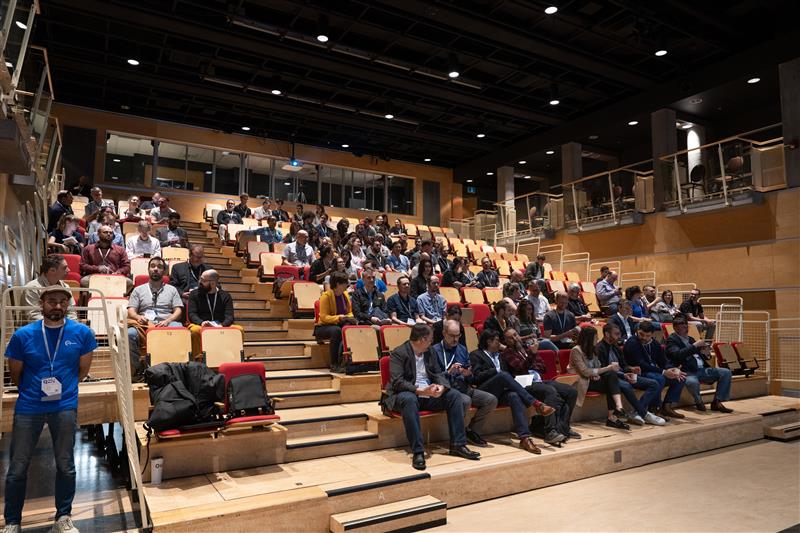From QA to AI and from AI to IQ: Crossed Perspectives on Quality
By Ali Amine Ghazali, Director, Centre of Excellence in AI – Digital Transformation
At the latest edition of Les Rencontres Québécoises de la Qualité et du Numérique (Q2N 2025) by Agile Quebec, I had the privilege of delivering a presentation entitled “From QA to AI and from AI to IQ: Crossed Perspectives on Quality.” On behalf of Cofomo, I shared our perspective on quality assurance (QA) in artificial intelligence (AI), a discipline in rapid evolution and increasingly central to the strategic concerns of both public and private organizations.

What organizations need to understand
AI is not monolithic. Every domain, from generative AI to computer vision and intelligent document processing, presents distinct QA challenges.
This means that:
- QA engineers and analysts must understand the specific type of AI they are testing.
- QA metrics must be adapted to business context and regulatory requirements.
- QA professionals need to develop new skills to validate AI solutions — for example, prompt engineering when testing a generative AI conversational agent.
- Monitoring is indispensable across all layers: data, models, access, performance, infrastructure, and logs.
A medical diagnostic system, for instance, cannot be evaluated the same way as a recommendation engine or an industrial robot. This distinction is critical: it separates generic approaches from true expertise in AI-specific QA.
New QA axes and metrics
AI projects differ fundamentally from traditional software projects. They rely not only on business needs and code, but on data quality, model performance, and parameter optimization.
Effective QA in AI now requires considering:
- Expanded QA axes: data quality, fairness and bias mitigation, predictive performance, security and privacy, transparency, and explainability.
- Specialized metrics: precision, recall, F1-score, R², IoU, bias detection, prompt injection resistance, GPU consumption, source traceability, and local explainability tools like LIME or SHAP.
- These practices must be embedded in a robust compliance framework, supported by standards such as ISO 42001, NIST AI, L25, and government AI strategies.
This is how organizations can build and maintain trust in their AI solutions.
Building skills and leveraging the right tools
The audience particularly highlighted:
- Structured skill-building paths supported by recognized certifications (ISTQB AI Tester, A4Q AI & Software Testing Foundation, TMMi).
- The growing importance of prompt engineering, essential for generative AI projects.
- Demonstrations of AI-enabled QA tools such as Sonarsource AI Codefix, Diffblue Cover, Applitools Visual AI, GitHub Copilot, Amazon Q, and Cursor AI — solutions that generate test cases, fix bugs, automate validations, and increase productivity.
- A practical demonstration: testing a generative AI sales assistant using the axes and metrics presented.
What this means for organizations
QA in AI is not just a technical requirement; it is a strategic lever.
For organizations, this means:
- Accelerating safe adoption of AI through adapted QA practices.
- Reducing regulatory and reputational risks by aligning with compliance frameworks.
- Improving performance and productivity through automation and continuous monitoring.
- Strengthening stakeholder trust by delivering AI systems that are transparent, explainable, and fair.
By embracing these approaches, organizations can deploy AI faster, more securely, in compliance and turning innovation into tangible, lasting value.
The role of Cofomo’s IA Centre of Excellence
At Cofomo, our Centre of Excellence in AI (CEIA) is central to this transformation.
We bring together leading practices, expert talent, and technology partnerships to:
- Define and implement new standards for QA in AI,
- Support organizations in their most complex AI initiatives,
- And actively contribute to the evolution of best practices across the community.
By participating in events such as Q2N, we are not simply sharing knowledge, we are reinforcing our role as a leader in industrializing responsible, trustworthy AI.
Q2N 2025 reinforced the importance of bringing together experts, decision-makers, and practitioners to collectively advance the future of AI. I extend my thanks to the organizers and volunteers for their outstanding work, flawless logistics, and high-quality discussions. For Cofomo, and through our Centre of Excellence in AI , the objective is clear: helping organizations transform AI quality assurance into a true strategic advantage.




